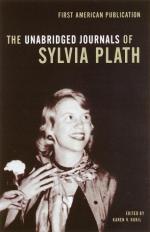|
This section contains 13,585 words (approx. 46 pages at 300 words per page) |

|
SOURCE: Broe, Mary Lynn. “The Colossus: ‘In Sign Language of a Lost Other World.’” In Protean Poetic: The Poetry of Sylvia Plath, 43-79. Columbia, MO: University of Missouri Press, 1980.
In the following essay, Broe discusses Plath's poetic vision during the writing of The Colossus.
Introduction
Before the advent of the posthumous volume Ariel in 1965, The Colossus poems were heralded as promising examples of well-crafted work. Critics described the poems as hardy in language and sensibility, marked by unsentimental vitality, “mint-new” rhymes and decisive rhythms: “concrete experience arranged in clean, easy verse, ornate where necessary.”1 In addition to her fine handling of language, Plath was praised for humor, cleverness, and exuberance: “Sylvia Plath writes clever, vivacious poetry which will be enjoyed most by intelligent people capable of having fun with poetry and not just being holy about it.”2 Even the most grotesque of The Colossus poems prompted another critic...
|
This section contains 13,585 words (approx. 46 pages at 300 words per page) |

|


